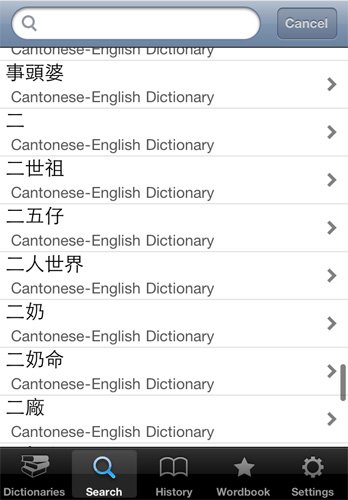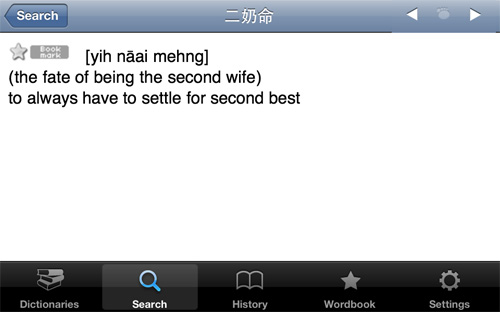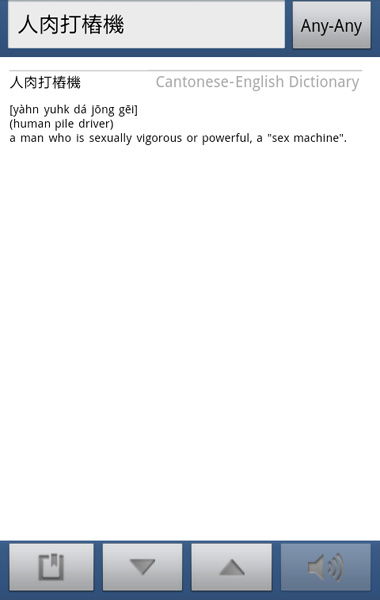http://writecantonese8.wordpress.com/2011/03/19/cantonese-stardict-file-fixed/
Hi, I put the fixed original tab file in my blog.
Hi, I put the fixed original tab file in my blog.
j40 said:http://bit.ly/f4201d
This Cantonese-Mandarin dictionary is good too and it is from the same authors of that Commercial Press book.
The publisher isn't Beijing Commercial Press.
j40 said:The drawback of dictionaries that are written by these authors is that neither Yale or Jyutping is used. (the one you couldn't buy and this one)
Some one even took time to create a new version of this dictionary with Jyutping!
j40 said:Hi, I put the fixed original tab file in my blog.
mikelove said:Very easy to deal with in our case - we'll do the same thing we do with Mandarin and encode all pronunciation in a neutral format which we can search / render using whichever pronunciation system people want. Jyutping / Yale / Sidney Lau / Meyer-Wempe / Guangdong... maybe we don't need all of them but we could quite easily support whichever ones are popular / in demand. We've been more reluctant to support lots of romanizations with Mandarin because Pinyin is pretty much the accepted international standard (even in Taiwan they seem to be slowly learning to live with it), but for Cantonese there doesn't seem to be nearly as much consensus.
samitakamaki said:Slightly off-topic: Whenever you'll roll out this functionality in Pleco, I'd be really glad if it supported Wade-Giles as well. For all of us relying on pre-pinyin scholarly works in our studies, the ability to quickly look up all those weird names would be nice.
Even more off-topic: Also, at said time it should also be very easy to add optionable, downloadable Hangul-support as well, right? This would make Pleco more important to my life than food.
Just pointing this out so you'll keep it in the back of your heads while working on more important improvements. Carry on everybody!



j40 said:I put my Stardict file in the apps that support Stardict Dictionary. My Stardict is Cantonese to English and these apps can't search in reverse direction... so it's kind of sucks
mnanon said:Any luck with Cantonese?
Anybody know any native Cantonese speakers with good English who'd be interested in some fairly boring contract work? Message us if so.
mnanon said:Any plans in creating integrations with Chinese/Cantonese books? Instead of writing answers in a textbook, you would write the answers on an App on your phone, and it would correct your writing.
alex_hk90 said:Just wanted to ask if a Cantonese dictionary is likely to be released in the near future? Otherwise I might look into converting one of the ones mentioned here to Pleco user dictionary format, to use for the time being until there's an officially licensed one. Thanks.
Thanks for the fast reply, that's good news and I would certainly be interesting in buying that add-on and Cantonese audio files as well.mikelove said:Depends on how you define "near future," but we're definitely making progress, yes.
alex_hk90 said:Thanks for the fast reply, that's good news and I would certainly be interesting in buying that add-on and Cantonese audio files as well. By "near future", I was thinking weeks rather than months. Anyway, I've converted a freely available (apparently, I'm not sure about copyright) Cantonese dictionary to Pleco format and once I've cleaned it up I could post the result on here for others to use until a proper (official) dictionary is available.
Yes, that is an issue. And also that it seems the user dictionary system does not work too well with many (100,000+) entries.mikelove said:The problem with that is that you won't be able to search it in Cantonese until we add official support for Cantonese to Pleco, which we haven't done yet - right now it should be searchable by characters but only by them, unfortunately.
alex_hk90 said:Yes, that is an issue. And also that it seems the user dictionary system does not work too well with many (100,000+) entries.
alex_hk90 said:With an official Cantonese dictionary and the current system, if the Jyutping (Cantonese romanisation) is in the definition then it should be able to search for that (via full-text searching, in the same way as searching for English in a Chinese dictionary), which wouldn't be a bad compromise in the short term.
alex_hk90 said:Regarding the Cantonese romanisation, a decision would have to be made between Jyutping and Yale, but I guess much of this will depend on what the licensed Cantonese dictionary uses (it's not difficult to convert between them but it's not quite a one-to-one mapping).
Thanks. I'll try that once I finish the import (ended up splitting it into 10,000 entry chunks as it was taking ages). More likely I'll have to try to find a Cantonese-only dictionary for now (i.e. with only the compounds words that won't appear in the Mandarin dictionaries, and the individual characters so that I can look up the pronunciations).mikelove said:True, we didn't performance-optimize it for massive dictionaries since that's not really its intended use. Works a bit better if you "Lock" the dictionary, though.
I meant if you released an official Cantonese dictionary add-on, but didn't make any other additions for Cantonese, then we could at least search by the romanisation in the definition for the time being.mikelove said:Except that we don't currently support full-text searches in user dictionaries.
I'm not sure, I only just looked into Cantonese romanisations a week or two ago. From this page (http://cburgmer.nfshost.com/content/cantonese-yale-syllable-table) it sounds like it might be more than that:mikelove said:I believe the only real issue is eo/oe versus eu, correct? The current plan is to use an internal coding system that's (probably) Jyutping-based but allow Cantonese to be searched/rendered in other systems too - there are too many people who only know one system or another so we really can't limit ourselves to just one.
I think there might be something to do with the tones that doesn't fully map either, but again I don't really know.The following Jyutping syllables are missing due to the lack of proper sources for a mapping between the two romanisations: lem, deu, gep, kep, loei, loet, pet, om (all in Jyutping). The table beneath thus is missing the Jyutping final set -oei, -oet, -om, -em, -ep, -et and -eu.
alex_hk90 said:I meant if you released an official Cantonese dictionary add-on, but didn't make any other additions for Cantonese, then we could at least search by the romanisation in the definition for the time being.
alex_hk90 said:I'm not sure, I only just looked into Cantonese romanisations a week or two ago. From this page (http://cburgmer.nfshost.com/content/can ... able-table) it sounds like it might be more than that:
The following Jyutping syllables are missing due to the lack of proper sources for a mapping between the two romanisations: lem, deu, gep, kep, loei, loet, pet, om (all in Jyutping). The table beneath thus is missing the Jyutping final set -oei, -oet, -om, -em, -ep, -et and -eu.
I think there might be something to do with the tones that doesn't fully map either, but again I don't really know.
dustpuppy said:Mike, do you have any updates on the progress of a cantonese dictionary ? It's a bit disheartening that I can't use the best language tool ever (pleco) to learn cantonese. At this point all i'm looking for is a one-way dictionary (cantonese -> english) which would let me read a cantonese piece of text.
